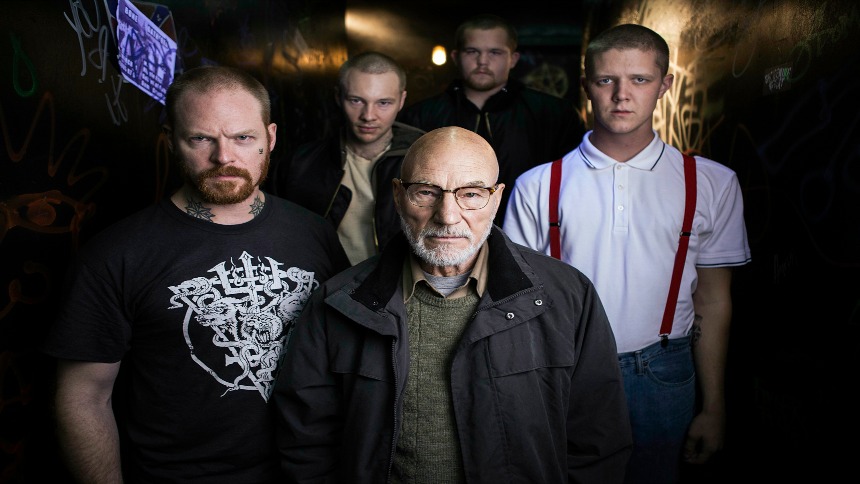Gamera Obscura: GREEN ROOM, the Definitive Film on the 2016 U.S. Presidential Election

Let me start by being perfectly clear about something: Green Room is wonderful and powerful in so many ways and on so many levels, that it hardly requires the following topical tie-in to provide a reason to appreciate it.
But if you’re considering persuading a non-fan of brutal thrillers to give Jeremy Saulnier’s latest work of brilliance a shot, here’s a new argument: it’s the preeminent film—prescient in its subtext, and devastating in its tragic dimensions—about America in 2016.
There are the obvious parallels, of course. The white supremacist gang led by Patrick Stewart’s character enjoys entertainment provided by the late Anton Yelchin’s band, which is absolutely desperate for work when they accept the gig. If there is a more apt illustration of certain Bernie Sanders’s supporters, or just working class families, bitter and willing to embrace any savior, allying themselves with an alt-right, me-first billionaire, please let me know. The unifying rationale internal to Green Room seems to be: hey, we’re all just punk rockers, right? So let’s just squint and hand-wave our way through this one-off event because none of us really have any other options.
Yet it turns out that our hero-rockers do have somewhat of a choice when it comes to what they play when they take the stage, courageously going with a cover of Dead Kennedys’ “Nazi Punks. F*** Off.” It turns out, then, that they will serve those with whom they share only the most superficial of values, and only the most expedient of objectives—literally selling themselves out—but they’ll do so on their own terms, as crazy-risky as those terms may be.
The band’s growing defiance doesn’t end there. In the course of what becomes a full-fledged siege movie, Yelchin & Co. find an unlikely collaborator in the person of Imogen Poots’s character. We even get a bit of "sympathetic" backstory, in which we learn why she became a hardcore racist. She sees the error of her ways, realizes she has more in common with the rebels than the reactionary murderers who were her buddies, and the political allegory continues from there.
All of these story elements in Green Room find echoes in the 2016 presidential election... or perhaps will, in its aftermath.
The “Berners” who opt for Trump—instead of Clinton, Johnson, or Stein (let alone true socialists such as La Riva and Kennedy)—may soon find themselves on the path of long-term regret. In this scenario, not only did they sell out their long-term values for short-term goals, but now they’ll find themselves struggling for political survival. In other words, who is most at risk from a Trump presidency? Potentially those same Leftists who hunger for change at any cost… and then wake up to find that silencing them is the first item on the change-agenda.
Certainly Trump supporters could make the same case about Hillary Clinton: she’ll eventually betray the socially and politically marginalized because, in the end, the Democratic Party whose standard-bearer she is, cares only about votes, not people. Converted into popular cinema, that premise might have actually made for a more interesting movie in some ways; that’s because characterizing the bad guys as overtly racist is the easy way out—imagine, instead, if Stewart had portrayed a smooth-talking liberal. His con-job from the other side of the green room door would have been that much more effective had those on the inside been predisposed to finding him ideologically sympathetic.
Yet the most meaningful connection to this year’s presidential election lies beneath all that open suspicion and conflict, speaking instead to the bad guys’ core motive. And that motive, of course, is cover-up. It’s about concealing a deed-already-done and preventing it from become known both to the authorities and to the wider mass of loyalists outside the leadership circle. Stewart needs to keep both the inciting incident—the brutal killing of a young woman—and the lack of punishment for the culprit hermetically sealed off, not allowing it to travel beyond the four walls where it occurred. And while the fact that the crime in question has a female victim should resonate with the never-Trump crowd, let's not forget that the central theme of the “Lock Her Up” mob is that Clinton has been adept at hiding crimes, including murder, over a period of decades. Indeed, new cover-up plots authored by both major party candidates seem to surface on a daily basis.
Ultimately, then, Green Room is really about trust—earning it, keeping it, and losing it. And sadly, the losing part of it seems to be the keynote of this U.S. election. No one trusts anyone else, including representatives of the news media, and everyone seems acutely aware of the precariousness of it all yet paralyzed to do anything about it. At this point I’m just hoping that this breakdown in trust—in one’s neighbors, in our leaders, in the political process itself—doesn’t result in a long, grueling national siege beginning on November 9.







